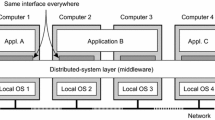Abstract
Tools that observe and manipulate the run-time behavior of parallel and distributed systems are essential for developing and maintaining these systems. Sometimes users would even need to use several tools at the same time in order to have a higher functionality at their disposal. Today, tools developed independently by different vendors are, however, not able to interoperate. Interoperability not only allows concurrent use of tools, but also can lead to an added value for the user. A debugger interoperating with a checkpointing system, for example, can provide a debugging environment where the debugged program can be reset to any previous state, thus speeding up cyclic debugging for long running programs.
Using this example scenario, we derive requirements that should be met by the tools' software infrastructure in order to enable interoperability. A review of existing infrastructures shows that these requirements are only partially met today. In an ongoing research effort, support for all of the requirements is built into the OMIS compliant on-line monitoring system OCM.
Similar content being viewed by others
References
J. A. Bergstra and P. Klint. The ToolBus coordination architecture. In P. Ciancarini and C. Hankin, eds., Coordination: Languages and Models: First International Conference COORDINATION '96, pp. 75-88. LNCS 1061. Springer Verlag. Cesena, Italy, April 1996.
Cray Research Inc. UNICOS CDBX Debugger User's Guide. Cray Publication SG-2094 8.0, 1996.
M. Oberhuber and R. Wismüller. DETOP––An interactive debugger for PowerPC based multicomputers. In P. Fritzson and L. Finmo, eds., Parallel Programming and Applications, pp. 170-183. IOS Press, Amsterdam, May 1995.
The Parallel Tools Consortium. PTools MQM working group home page. www page http://www.ptools.org/projects/mqm/.
R. Wismüller. State based visualization of PVM applications. In Parallel Virtual Machine––EuroPVM'96, pp. 91-99. LNCS 1156. Springer. Munich, Germany, October 1996.
M. Litzkow, T. Tannenbaum, J. Basney and M. Livny. Checkpoint and migration of UNIX processes in the condor distributed environment. Technical report 1346. Univ. of Wisconsin-Madison, Comp.Sci. Dept., April 1997.
G. Stellner and J. Pruyne. Resource management and checkpointing for PVM. In EuroPVM'95, volume 5 of Parallélisme, réseaux et répartition, pp. 131-136. Hermès. Lyon, France, September 1995.
M. Frey and M. Oberhuber. Testing and debugging parallel and distributed programs with temporal logic specifications. In Proc. of 2nd Workshop on Parallel and Distributed Software Engineering dy1997, pp. 62-72. Boston, May 1997.
K. J. Sullivan. Mediators: Easing the design and evolution of integrated systems. Technical report 94-08-01. Dept. of Computer Sciences and Engineering, Univ. of Washington, 1994.
J. C. Cunha and V. Duarte. Monitoring PVM programs using the DAMS approach. In Recent Advances in Parallel Virtual Machine and Messag Passing Interface, Proc. EuroPVM/MPI'98, pp. 273-280. LNCS 1497. Springer. Liverpool, UK, September 1998.
D. Pase. Dynamic probe class library (DPCL): Tutorial and reference guide, Version 0.1. Technical report. IBM Corp., Poughkeepsie, NY, June 1998.
A. M. Julienne and B. Holtz. ToolTalk & Open Protocols––Inter-Application Communication. A Prentice Hall Title. SunSoft Press, Englewood Cliffs, NJ, 1994.
G. Paul, K. Sattler and M. Endig. An integration framework for open tool environments. In H. König, K. Geihs, and T. Preuβ, eds., Distributed Applications and Interoperable Systems, pp. 193-200. IFIP, Chapman & Hall. Cottbus, Germany, September 1997.
F. Long and E. Morris. An overview of PCTE: A basis for a portable common tool environment. Technical report CMU/SEI-93-TR-1. Carnegie Mellon Univ., Pittsburgh, PA, March 1993.
R. Wismüller, J. Trinitis and T. Ludwig. OCM––A monitoring system for interoperable tools. In Proc. 2nd SIGMETRICS Symp. on Parallel and Distributed Tools SPDT'98, pp. 1-9. ACM Press. Welches, OR, USA, August 1998.
T. Ludwig, R. Wismüller, V. Sunderam and A. Bode. OMIS––On-line Monitoring Interface Specification (Version 2.0). Shaker Verlag, Aachen, Germany, 1997. ISBN 3-8265-3035-7.
R. Wismüller. Interoperability support in the distributed monitoring system OCM. In R. Wyrzykowski, ed., Proc. 3rd International Conference on Parallel Processing and Applied Mathematics-PPAM'99, pp. 77-91. Technical University of Czestochowa, Kazimierz Dolny, Poland, September 1999.
J. K. Hollingsworth and B. Buck. DyninstAPI Programmers' Guide, Release 1.2. Univ. of Maryland, College Park, MD 20742, September 1998.
J. Cargille and B. P. Miller. Binary wrapping: A technique for instrumenting object code. ACM SIGPLAN Notices, 27(6):17-18, 1992.
Author information
Authors and Affiliations
Rights and permissions
About this article
Cite this article
Wismüller, R., Ludwig, T. Interoperable Run-Time Tools for Distributed Systems—A Case Study. The Journal of Supercomputing 17, 277–289 (2000). https://doi.org/10.1023/A:1026515407398
Issue Date:
DOI: https://doi.org/10.1023/A:1026515407398




